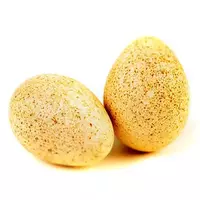Turkey egg

Perhaps even now, for the vast majority of the inhabitants of our latitudes, turkey has not become a common food. Historically, other varieties of poultry or game began to enjoy greater popularity in Slavic lands at some point. However, for residents of some European countries, as well as the United States, turkey has become not only important, but also one of the favorite food products.
We think many are aware of one of the oldest American traditions, according to which a completely baked turkey is considered a mandatory and even main dish on the Christmas table of each American family. Domestic turkey or Meleagris gallopavo refers to the Kuroiform order. Residents of the New World, and this name was given to America by European discoverers, domesticated wild turkeys and began to breed poultry for meat and eggs. Turkey eggs have a special place in the culinary tradition of some countries, as well as poultry meat.
Due to its distinctive taste and consumer qualities, turkey meat is in constant demand among American and European consumers. However, not only poultry meat benefits humans, the chemical composition of turkey eggs also contains a sufficient amount of vitamins, as well as other useful substances of natural origin. For example, a turkey egg contains a large amount of vitamin V9 or folic acid, as well as vitamins V1, V2, V5, V6, and V12, as well as A and PP. In addition, turkey eggs contain magnesium, potassium, phosphorus, as well as selenium and zinc.
It is believed that the turkey egg is much tastier and healthier than chicken. This statement is only half true, since turkey eggs contain much more cholesterol in their composition than chicken eggs. It is worth noting that turkey eggs occupy the third place in a kind of "egg" rating, where the taste and dietary properties of the product are taken into account first of all. So the turkey egg was inferior in basic parameters only to quail eggs and guinea fowl eggs.
Turkey eggs are used in cooking, as are chicken or any other type of poultry egg. Turkey eggs can be used to cook omelettes or fry scrambled eggs, as well as cook the product, add to salads, soups or main dishes. Since turkey eggs contain more useful compounds in their composition, the product is recommended to be used in the diet of baby food.
However, do not forget that any product, including turkey eggs, will benefit you and your family with proper and moderate eating. This means that you should not rush to extremes and learn about the positive effect of turkey eggs on the health of the human body, consume the product in large quantities. Nutrition should be balanced and correct. In this case, the turkey egg will be able to become a tasty, nutritious, and most importantly useful product in your daily diet.
turkey eggs 171 kCal
Energy value of turkey egg (Ratio of proteins, fats, carbohydrates - ju):
Proteins: 13.68 g (~ 55 kCal)
Fats: 11.88 g (~ 107 kCal)
Carbohydrates: 1.15g (~ 5kCal)
Energy ratio (bj | y): 32% | 63% | 3%
 Español
Español Français
Français Português
Português Русский
Русский 简体中文
简体中文 繁體中文
繁體中文 日本語
日本語 한국어
한국어 العربية
العربية Türkçe
Türkçe Қазақ
Қазақ Deutsch
Deutsch Italiano
Italiano Українська
Українська
